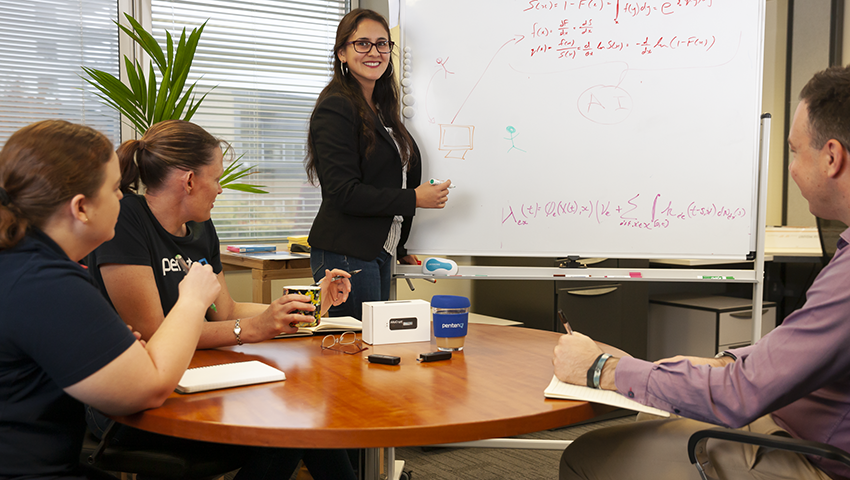Share this article on:
Powered by MOMENTUMMEDIA
Powered by MOMENTUMMEDIA
Breaking news and updates daily.
Australia’s cyber security profession needs to attract and retain more of its workforce from women and non-binary genders, but first there are historical barriers to address.

Other genders needed to lift cybersecurity profile
Cybersecurity is one of Australia’s fastest-growing strategic sectors, as government and industry deal with escalating cyber threats.
Public and private sectors are ramping up their capabilities to deal with the spectre of cyber attacks on critical infrastructure, supply chains and essential services.
Having the right technology to counter cyber threats is crucial.
But another crucial element is needed, and in significantly greater supply: a diverse and highly-skilled workforce.
Despite facing a rapid rise in cybersecurity risk, Australia is failing to train, produce and attract the required talent to prevent, detect and respond to today’s and tomorrow’s cyber attacks.
Cyber security offers attractive career prospects for STEM graduates.
Research commissioned by Penten estimates that Australia’s cybersecurity workforce has grown to more than 26,000, with further solid growth predicted as new cyber threats develop and evolve.
One major barrier, however, is the industry’s failure to attract enough talented women and non-binary gendered, who collectively are significantly under-represented in the sector. In Australia, women are estimated to comprise barely 15 per cent of the workforce in cyber security.
Globally, the figures are notably worse, with women making up around 11 per cent of the total cyber workforce.
The challenge of lifting diversity in the cyber field starts in the classroom.
Within government and industry in Australia, there is a recognition that more girls must be encouraged to study and work in STEM.
Girls who graduate in STEM streams are well-qualified to progress their careers in the cyber security sector. Other professionals, including those with human resource and business management skills, are also desperately needed in Australia’s cyber security sector.

Women as cybersecurity pioneers
But the gender gap in cybersecurity wasn’t always there. In fact, there was a time when women dominated cybersecurity roles.
Take, for instance, Bletchley Park – the home of Britain’s codebreaking operation during World War 2 and the birthplace of modern computing. At the height of wartime operations more than 75 years ago, women comprised two-thirds of Bletchley Park’s 10,000-strong workforce.
The coding and decoding of messages in wartime was generally considered a clerical task, usually performed by women. Men were generally employed at the time on frontline military service and other, more technical roles.
And so, while the numbers and contributions of women at Bletchley Park are remarkable, female dominance in cybersecurity was short-lived.
Once the war was over, women generally returned to domestic or non-technical roles. Participation rates of women in the emerging cyber security sector, as with many other professions, declined in subsequent decades.
Until 1966, for example, married women were barred from full-time employment in Australia’s Commonwealth Public Service.
By the 1970s, computer programming was seen as a lucrative profession requiring the then stereotypically male strengths in logic, mathematics and electronic circuits.
Since then, the technology sector has often been perceived as the domain of masculine stereotypes, complete with the popular image of the male computer geek and hacker, working alone in their bedroom or workshop.

Personal computers – designed by men, for boys.
Women continued to be side-lined in cyber-related roles through the 1980s, including through the emergence of the first personal computers.
Indeed, boys and men became the preferred market for the first personal computers which, at the time, were seen primarily as gaming devices. Families were more likely to buy computers for boys rather than girls, which gave young men a head start in the burgeoning computer sciences field.
Male school-leavers were more likely to be drawn to a career in computer programming, armed with their qualifications in electronics, information technology or mathematics. Women were frequently marginalised in the male-dominant sector, with little validation of their skills; many female school-leavers were instead encouraged to pursue careers in areas such as education, health and human resources.
Many of those women who did work in computer technology were marginalised by a heavily male-dominated environment.
Indeed, some women reported to experience the ‘imposter phenomenon’ of not fitting into their chosen career in cybersecurity and related fields, despite being appropriately qualified and equipped.
And when they did persist with careers in technology, defence or cybersecurity, many women reported workplace hostilities, professional segregation and a lack of support from management – with very limited prospects for career advancement. Many women were also discouraged by a lack of mentoring opportunities from suitable female role models.
Where to from here?
For starters, we – the Australian cyber security sector – need to expand the supply of talent required to grow and sustain a diverse, creative and competitive industry. We need to recognise that talent is not defined by gender or culture, and that all workplaces and industries benefit from diversity of thought.
We need to understand the barriers preventing potential talent from exploring, pursuing or sustaining careers in cyber security. And we need to break down those barriers – soon.
Australia’s cyber security sector has no time to lose.
Next week, Penten explores the various ways in which Australia’s cyber security sector is working to attract and retain a more diverse workforce – including some innovative approaches to overcoming traditional gender biases in cyber.
Author: Jane Landon, Applied AI Operations, Penten
Penten is an Australian, cyber company focused on innovation in secure mobility, applied artificial intelligence (AI) and tactical communications security.
In 2019 and 2020 Penten was awarded Cyber Business of the Year at the Australian Defence Industry Awards.
For more information visit www.penten.com
Be the first to hear the latest developments in the cyber industry.